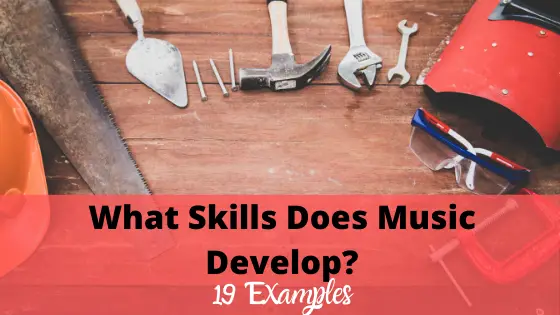In almost every music teacher interview, you’re asked a question about why kids should get music.
There are a ton of answers you can give, but I think the most effective one answers: What skills does music develop?
Music develops skills on a variety of different levels from music skills, cross-curricular skills, and general success-in-life skills. These skills are developed in large amounts due to music’s ability to engage both hemispheres of the brain, connect meaningfully to all areas of life, and teach life-long lessons through the challenging yet rewarding art.
Read on for more concrete ways to explain this to others and defend music.
Table of Contents
Music Skills
The first and most obvious skill music develops is…well, musical skills. These are still valuable skills to develop even if you don’t want to go on to have advanced musical training.
There are a ton of the musical skills you develop when taking part in music classes, but here are a few of the key ones.
Beat Awareness – The awareness of beat (or pulse of music) is essential for so many skills related to music and other things in life. Those with awareness of beat can dance to music, rock a baby, and chant together at an event.
Rhythm – The patterns of long and short over the beat, rhythm is an essential part of all music. Rhythm is also a critical part of language development and fluency.
Melody – Pitch, the awareness of high and low, and melody, pitch plus rhythm, can help us sing Happy Birthday together or songs on the radio without making others cringe.
Learning how to better hear pitches and tone is a huge part of other languages and to a small degree our own.
Harmony – Performing multiple parts at the same time with others. This takes your musical performance quality to the next level.
When it comes to mental multi-tasking, hearing your own part and that of others is an amazing skill to have, and one that comes in handy with any number of jobs.
Expression – Expression skills involves singing and playing in ways that are more than just notes and rhythms. It’s feeling and connecting with the music.
This is when you sing sweet songs to your children when they’re sick, or sing along with your song to your spouse on the dance floor.
Music programs should be upfront about how important music is to what it means to be human.
Cross-Curricular
While cross-curricular skills may not be the goal of the music classroom, it is an important side effect to point out to stakeholders like parents and admin who aren’t convinced by the other musical skills.
Music literally helps out every subject, but these ones get a big benefit from music classes.
Reading – Music improves reading skills by exposing children to text married with melody. This helps students connect reading better with other areas of their brain.
Some research has even found singing with your preschool-aged kids to be as effective as reading when it comes to language and fluency (this is part of why music therapy is among the most effective interventions for those with language difficulties).
Fluency – The beat and rhythm of music and singing improve a student’s fluency. They feel the flow and natural rhythm of words better.
My father-in-law had a terrible stutter as a kid. He helped to overcome that by singing difficult tongue-twister style songs.
In fact, most people with a stutter can sing just fine because music uses a different part of the brain.
Vocabulary – Great folk songs expose students to more vocabulary. Often, they’ll use words which aren’t typical ones they’d learn otherwise, and a larger vocabulary is an important predictor of success in school and life.
Mathematical – The mathematical rhythmic elements help practice and improve some aspects of math.
Many musicians were also great mathematicians, and some mathematicians were also great musicians.
Albert Einstein himself was an accomplished violinist and had a choice between pursuing a career in music and one in physics.
Mathematical-Spatial – The spatial representations and performance of pitch and rhythm are shown to dramatically increase spatial reasoning.
History – Songs and pieces are a great launching point for personal discussions about history.
Music is a great launching point for talking about people of the past and for building empathy and connection with those events.
Cultural – Performing music of other cultures helps you better empathize with people you have little in common. It connects you on a deeper level.
Physical – One of the often forgotten benefits of music is the increase in motor skills that comes along too.
A lot of athletes will take extra music training or even dance to help with their coordination and flexibility.
If you look at Dancing With The Stars, athletes are among the most successful partly because of this reason.
Life-Long Skills
I think music’s effect on developing life-long skills is even more important than both of the previous categories combined. Music for music’s sake is fine and so is music for academia’s sake.
But music for life’s sake goes to the heart of music’s true power.
Bennett Reimer, author of A Philosophy of Music Education, at one point describes music as the language of feelings and meaning which can’t be expressed in words.
Music improves life in the following ways (just a few examples, I know there are more).
Empathy – Performing music gives you insight into other people, cultures, and times. This makes you understand them and their experiences more, making you overall more empathetic.
This increased level of empathy also helps with social skills too.
Emotional Awareness – The emotional power of music and the practice of expression help you to recognize the emotion in yourself better.
Music improves emotional development, especially in those who are “stunted.”
Determination/Grit – Music is hard to do. Performing well takes skill and practice practice practice.
Mastering music helps you develop determination and grit in the face of difficulties and adversity.
Some advanced degree programs such as medical and law degrees, actually prefer to accept those with musical training because these people already know how to do the hard work.
Organization – Music has many (many many) different elements to it. Performing helps your brain learn to organize a lot of information which it then can use in all other aspects of life.
Discipline – Music skill takes consistent practice and effort over time. This self-discipline is a must for leaders and those wanting to find success in life.
Critical Thinking – Even if you can perfectly perform every notation on a piece of sheet music, you will need to make your own mark on music. This decision comes as a result of critical thinking which balances all your prior knowledge and experience.
Social Skills – Music very rarely exists in a one-person vacuum. Even solo artists must perform for others.
Music shows you how to connect with other people socially. Ensembles help you learn to trust, rely on, and interact with each other better.
My Interview Answer
“Why should music be in schools? What skills does music develop? What are the benefits of music education?”
(Insert strategic pause to gather words.)
Aside from the fact that music is part of what makes us human (after all every culture in the history of humanity has music as an essential part of their lives), music can develop skills to benefits every aspect of everyday life.
There is, of course, all the data suggesting how music improves grades over time and can help students focus better, but I think it’s most important to value music for the skills it develops.
Naturally, there is the musical skill we develop:
- Beat and rhythm to help us dance and cheer together
- Pitch, melody, and harmony to help us sing happy birthday and along to the radio without making others cringe
- And expression to help sing to our toddlers and babies when they’re sick or cranky to calm them down.
It also does connect to other curricular areas without any additional work. Music naturally helps with reading, fluency, vocabulary, math, spatial reasoning, history, and cultural understanding.
(Did you know that most students who stutter when speaking won’t stutter at all when singing?)
Most importantly, though, are the life-long skills music helps impart. Skills like empathy, emotional awareness, grit, organization, discipline, and social sensitivity.
These are the things, I believe, that truly predict success in life and music hits these in a way almost no other subject does.
That’s why I think music should be in schools. Music builds better humans. Period.
Conclusion
I hope you found learning about what skill music does develop helpful!
Being able to articulate the music, cross-curricular, and life-long skills you learn from music is something you’ll use with your students, fellow teachers, administrators, and parents.
Whether you’re in music lessons, music schools, or normal music classes, every skill is improved through music.
Did I miss any important skills? Comment below to let us know.

